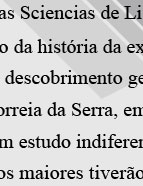

................................
The activity of the Academia in the publication of documents was noteworthy from the beginning of the century. Indeed, on 8 March 1877, the Academia decided to go ahead with the writing of a "critical history of the Portuguese navigations and discoveries since the 15th century" (S. C. Matos, Idem, p. 57). Hence, Pinheiro Chagas delivered his lecture on the Descobrimentos portugueses na África [Portuguese Discoveries in Africa] (1877) to encourage this achievement, and its need was acknowledged. This responsibility fell to João de Andrade Corvo, and then, as a result of his death, to Pinheiro Chagas, as a result of whose death, to Zófimo Consiglieri Pedroso. Pinheiro Chagas proceeded to publish Os portuguezes na África, Ásia, América e Oceânia... [The Portuguese in Africa, Asia, America and Oceania] (1890) and Os descobrimentos dos Portuguezes e os de Colombo [The Discoveries of the Portuguese and Columbus] (1892). Contributions began to accumulate in an effort that, alas, proved to be premature. The time had not yet come to achieve the desired results, and therefore became a vague and unrealised project. Nevertheless, the number of sources and published studies had considerably enlarged as a result of the attempt.
In História de Portugal [History of Portugal] (1879, 3rd ed. extended in 1882), O Brasil e as colónias portuguesas [Brazil and the Portuguese Colonies ] (1880) and in Portugal nos Mares: ensaios de história e geographia [Portugal in the Seas: essays on history and geography] (1889), Oliveira Martins problematises the history of the discoveries for the first time, although he does not separate it in terms of method and discipline from the whole History of Portugal. The Infante D. Henrique [Henry the Navigator] is lauded as the author and promoter of the discoveries: he is responsible for the attraction to Prester John and the attempt to undo the fanciful legends of the Atlantic, regarded as the Dark Sea, about which horrors and wonders were dreamt. In his ambitious mind "there was room for his enterprises: to conquer the Moroccan empire, or at least its coastline, to ensure trade from Sudan; and at the same time to conquer the dark forces of the islands of that unknown sea, continuing along the western coasts to visit and explore them. Tenacious and unyielding, D. Henrique sacrificed everything for the progress of his enterprise [...]." It was to him that Portugal owed "the honour of preceding the European nations in the work on the recognition and allegiance of the entire globe." (O. Martins, Historia de Portugal, tome I, 1882, 166-167) The prince settled in Sagres surrounded by a kind of Renaissance "academy" of educated people and experts in cosmography and the art of navigation. "Having considerable wealth, he established an observatory and a nautical school in Sagres, for the study of navigation and cartography." (Id., Os filhos… [The children…, p. 124).
